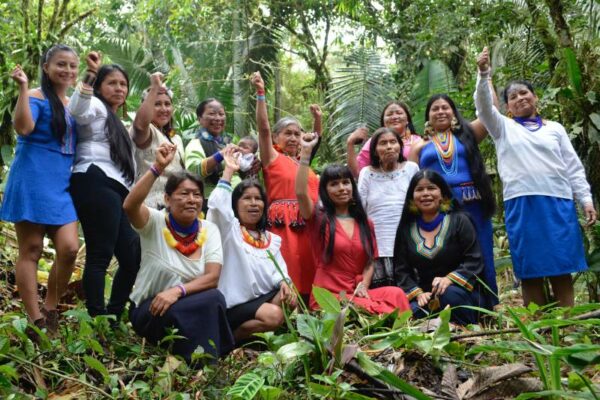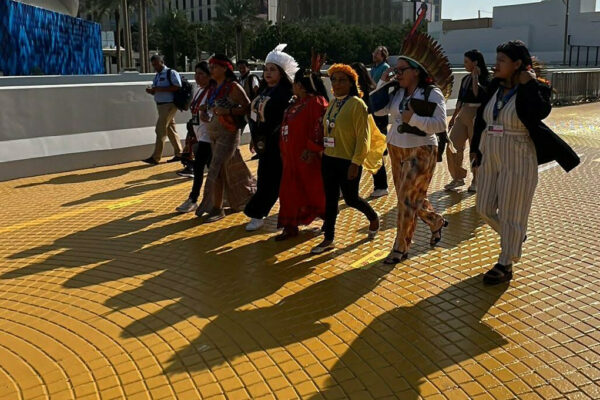Cubara, Colombia – Roberto Perez chews a cluster of dry
coca leaves as he stands near a precipice overlooking a valley of rain
forest and swift rivers.
Legend has it that Perez’s U’wa Indian ancestors jumped to their deaths from
a similar ridge 500 years ago to avoid enslavement by Spanish conquistadors.
Perez, a shy and mild-mannered U’wa leader, says his people will not commit
mass suicide this time, but warns they will do whatever it takes to defend
their land from the latest “intrusion” – a planned U.S. aid package to
train an army battalion.
The $98 million in aid is aimed at preparing Colombian forces to protect an
oil pipeline that runs near U’wa territory from attacks by Marxist rebels,
but tribal leaders fear it will spread Colombia’s 38-year-old war across
their land.
The U’wa, an impoverished semi-nomadic indigenous group in northeastern
Colombia, gained international attention two years ago when they fought a
protracted battle against Los Angeles-based Occidental Petroleum (NYSE:OXY – News) that sought to drill next to their reservation.
Occidental withdrew from the project this year after failing to find
commercially viable oil deposits.
The controversy had been a public relations nightmare for the U.S. company
as vociferous international environmental organizations cast the dispute as
a David versus Goliath struggle between indigenous groups and corporate
power.
Now U’wa leaders fear Washington’s plan, which is being discussed in the
U.S. Congress, could drag them into a military conflict that kills thousands
of people every year.
“We have our own law. The army and the rebels should respect us. We don’t
want them on our land,” said Roberto Cobaria, an U’wa leader with a wispy
mustache.International green groups are bracing for a new battle.
“Our campaign is not over. We campaign for the indigenous groups’ right to
self-determination, be that against oil or U.S. military aid,” said Kevin
Koenig, a spokesman for Amazon Watch, a group based in Oakland, California, that has taken up the U’wa cause.
‘THINKING PEOPLE’ SUFFER DISCRIMINATION
The U’wa, which means “the thinking people” in their language, are one of
Colombia’s 80 indigenous ethnic groups.
For centuries they have suffered oppression and discrimination at the hands
of Spanish colonizers and Colombian government.
Their numbers have dwindled dramatically – to 5,000 from 20,000 in 1940.
They live in remote mist-shrouded mountains, having lost large parts of
their ancestral land to government expropriations and incursions by
displaced peasants fleeing the violence of the country’s largely rural war.
Near Cubara, the main town on the tribe’s reservation, children with
stomachs swollen from malnutrition sat in the dirt in one settlement of mud
huts inside the reservation. There is no electricity or running water.
One girl, barely 15, breast-fed two babies as scrawny chickens pecked around pools of rain water. Inside a smoky hut, elders gathered around a wood fire and drank “chicha,” a traditional beer made of fermented maize. Most didn’t speak Spanish and seemed suspicious of foreigners.
The lifestyle of most U’wa has changed little in 500 years although tribe
leaders have set up a campaign office in Cubara equipped with telephones and fax machines. The leaders live in the town, and dress in the same shirts and trousers as other country Colombians.
WRATH OF GOD
The U’wa, a firmly religious people, believe that exploiting their sacred
rivers and forests would unleash the wrath of “Sira” (God).
They regard oil as the “blood of Mother Earth” and say drilling is like
“stabbing a knife into your stomach.” They carry coca leaves – the raw
material for cocaine – in gourds around their necks and chew them to “gain
strength and wisdom.”
The land dispute with Occidental entered the U.S. presidential election in
2000 as environmental groups criticized Democratic candidate Al Gore for
owning company shares.
When Occidental won a court order to sink a test well after a seven-year
legal wrangle, Colombian soldiers were deployed near the reservation and
military helicopters hovered in the skies to prevent protesters from
blocking the drilling.
Word that the U’wa were considering walking off the 1,400-foot (400-metre)
“Cliff of Death” to fight the “invaders” as they did against the Spanish
caused a media frenzy even though the U’wa later ruled out such drastic
action.
“The collective suicide was something our ancestors did 500 years ago to
avoid becoming slaves. We are going to fight until the end to defend our
land but we are not thinking of jumping off the cliff,” said Perez, 60, who
has 10 children.
OIL IS TROUBLE
History of Colombia shows that oil means trouble. Discoveries of oil – the
country’s main export – have brought violence from all sides fighting in
Colombia’s war and done little in the way of lifting the people from
poverty.
After the Cano Limon pipeline opened in the 1980s the two Marxist rebel
groups that operate in the area grew fat by extorting private companies
servicing the pipeline. Right-wing paramilitary outlaws have also moved into
the area.
In 1999, the rebels of the Revolutionary Armed Forces of Colombia – known
as “FARC” – kidnapped and killed three U.S. Indian activists who were
visiting U’wa territory.
When the oil controversy faded away, the television cameras went home and
the U’wa were left to their poverty and mud huts. Tall grass is overtaking
the old drilling site and the sound of the rushing waters fills the air. The
U’wa said they want the government to invest in hospitals and schools, not
oil or war. After the White House announced the new aid package earlier this year, U.S.-based environmental groups began mobilizing a new campaign and U’wa leaders were back in the spotlight.
U’wa leaders say they appreciate the solidarity received from international
groups. Occidental and government officials say the Indians have been
manipulated by outsiders. U’wa leaders have flown to Los Angeles, Washington and many European capitals – paid by foreign support groups – to promote the U’wa plight at anti-globalization forums.
“These are groups that depend on fund-raising to survive and are always
looking for causes in developing countries to raise their profile,” an
Occidental spokesman said. “They don’t seem to have a problem when they fly the U’wa leaders around the world burning the ‘blood of Mother Earth.'”
U’wa support groups say such claims are ridiculous and accuse big oil
companies of trying to silence the voice of the indigenous community. Amazon Watch spokesman Koenig, who has never been to Colombia, said his group’s job is “to shed the media spotlight so that the voices of the U’wa can be
heard.”













